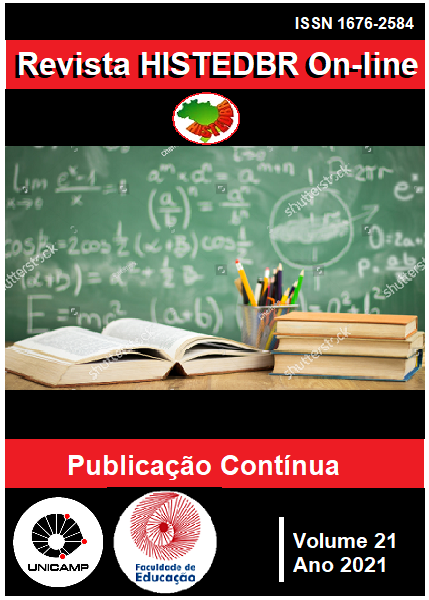Abstract
The literacy of a people can promote much more than learning to read and write, as Paulo Freire (1987) points out, it can promote liberation and citizenship, a new model of man and a new awareness of the world. In this work, the objective was to outline some reflections on how the construction, through literacy, began of the model of the ideal Cuban man: the new man. The methodological procedure was a bibliographic research, of a historiographical character based on the research project: Cuba and the revolutionary teacher education: the construction of the New Man linked to the State University of Maringá-UEM. The Alphabetical Manual (CUBA, 1961b) and Fidel Castro's speeches in the 1960s, 1961 and 1967 and Che Guevara's 1965 speech were delimited as a primary source. In a scenario of social transformation, Cuban education was reformulated from 1959, with a view to the construction of a new pedagogical model of a political, social, economic and cultural character. The first step towards this reformulation was the Literacy Campaign carried out in 1961, in which it was necessary to make each Cuban a teacher. Thus, the anthropological project of Cuba was developing and gaining characteristics in the context of the formation of the literacy teacher in order to transform, at the same time, the apprentice into a master. The study concluded that discussing Cuban literacy practices can greatly promote reflection on issues that involve an efficient process of combating illiteracy in its various facets.
References
AMARAL, R. G. A. S.; RESENDE, S. G. Educação e contradição: implicações teorico- práticas na formação docente. Colloquium Humanarum, v. 15, n. especial 2, jul./dez. 2018. Disponível em: http://www.unoeste.br/site/enepe/2018/suplementos/area/Humanarum/Educa%C3%A7%C3%A3o/EDUCA%C3%87%C3%83O%20E%20CONTRADI%C3%87%C3%83O%20IMPLICA%C3%87%C3%95ES%20TEORICO%20PR%C3%81TICAS%20NA%20FORMA%C3%87%C3%83O%20DOCENTE.pdf. Acesso em: 07 ago. 2019.
CASTRO, F. ¡Cumpliremos! Temas sobre la Revolución para los Alfabetizadores. La Habana, Cuba. 1961a.
CASTRO, F. Discurso Pronunciado por el Comandante Fidel Castro Ruz, Primer Ministro Del Gobierno Revolucionario, en el Acto De Inauguración de la Ciudad Escolar “Abel Santamaría”, Donde Antes Estaba El Cuartel Militar “Leoncio Vidal”, en la Ciudad de Santa Clara, el 28 de Enero de 1961b. Disponível em: http://www.cuba.cu/gobierno/discursos/1961/esp/f280161e.html. Acesso em: 07 ago. 2019.
CASTRO, F. Discurso do comandante Fidel Castro Ruz, Primeiro-Ministro do governo revolucionário, na sede da Nações Unidas, Estados Unidos, 26 de setembro de 1960. Disponível em: http://www.cuba.cu/gobierno/discursos/1960/esp/f260960e.html. Acesso em: 07 ago. 2019.
CASTRO, F. Discurso pronunciado por el comandante Fidel Castro Ruz, primer secretario del Comite central del partido comunista de cuba y primer ministro del gobierno revolucionario, en la velada solemne en memoria del comandante Ernesto Che Guevara, en la plaza de la Revolución, el 18 de octubre de 1967. Disponível em: http://www.cuba.cu/gobierno/discursos/1967/esp/f181067e.html. Acesso em: 05 ago. 2019.
CASTRO, F. Educação em revolução. Lisboa: Iniciativas Editoriais, 1976.
CUBA, Ministerio de la Educación. Alfabeticemos manual para el Alfabetizador. La Habana:
Imprenta Nacional, 1961a.
CUBA, Ministerio de la Educación. Congreso Nacional de Alfabetización. La Habana: Imprenta Nacional, 1961b.
CUBA, Ministério de la Educación. ¡Venceremos! La Habana: Imprenta Nacional, 1961c.
FERNANDES, F. O que é revolução. São Paulo: Brasiliense, 1984.
FREIRE, P. Pedagogia do oprimido. 17. ed. Rio de Janeiro: Paz e Terra,1987.
GILLETTE, A. A Revolução Educacional Cubana. 1. ed. Lisboa, Portugal: Moraes Editores, 1977.
GOTT, R. Cuba: uma nova história. Rio de Janeiro: Jorge Zahar, 2006.
GUEVARA, E. C. Ernesto Che. Notas para o Estudo da Ideologia da Revolução Cubana. In: SADER, E. (Org.). Che Guevara – Política. 1. ed. São Paulo: Expressão Popular, 2004.
GUEVARA, E. C. O socialismo e o homem em Cuba. Semanário Marcha, Montevideo. Março de 1965.
HUTEAU, M.; LAUTREY, J. Cuba: revolução no ensino. Trad. de Manuela Leandro e Fernanda Campos. Coimbra: Centelha, 1976.
LÓPEZ, M. Q. A educação em Cuba: seus fundamentos e desafios. Estudos avançados, v. 25, n. 72, p. 55-72, 2011. Disponível em: https://www.scielo.br/j/ea/a/59RgF5TRjwjXnsLBBqbgXdc/?lang=en&format=pdf. Acesso em: 05 ago. 2019.
MARX, K. Manuscritos econômico-filosóficos. Tradução de Jesus Ranieri. São Paulo: Boitempo, 2004.
MARX, K.; ENGELS, F. A ideologia alemã (Feuerbach). 5. ed. Tradução de José Carlos Bruni e Marco Aurélio Nogueira. São Paulo: Hucitec,1986.
PEREIRA, M. Rebeldes sem armas: alfabetizadores cubanos em ação. São Paulo: Ática, 1989.
PERONI, V. M. V. A campanha de alfabetização em Cuba. Porto Alegre: UFRGS, 2006.
SOARES, M. Alfabetização e letramento. 7. ed. São Paulo: Contexto, 2017.
SWEEZY, P. M.; HUBERMAN, L. Cuba: anatomia de uma revolução. Rio de Janeiro: Zahar, 1960.

This work is licensed under a Creative Commons Attribution-NonCommercial 4.0 International License.
Copyright (c) 2021 Dayane de Freitas Colombo Rosa, Roseli Gall do Amaral, José Joaquim Pereira Melo


